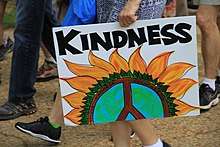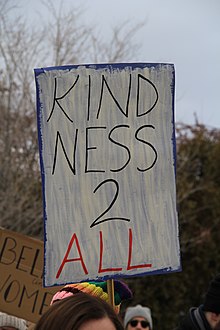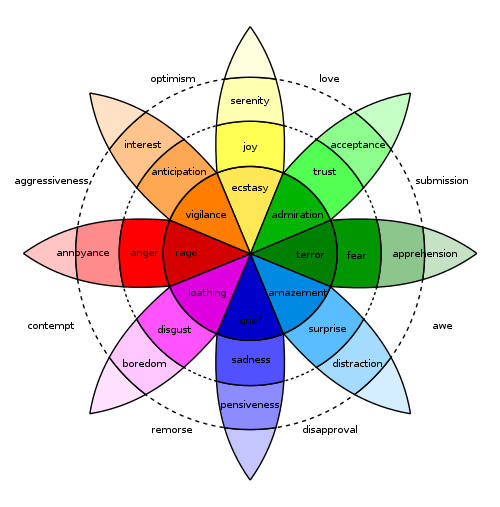Kindness
Kindness is a type of behaviour marked by acts of generosity, consideration, or concern for others, without having an expectation of praise or reward. It is considered a virtue and is recognized as a value in many cultures and religions (see ethics in religion). In Book II of "Rhetoric", Aristotle defines kindness as "helpfulness towards someone in need, not in return for anything, nor for the advantage of the helper himself, but for that of the person helped".[1] Nietzsche considered kindness and love to be the "most curative herbs and agents in human intercourse".[2] Kindness is considered to be one of the Knightly Virtues.[3] In Meher Baba's teachings, God is synonymous with kindness: "God is so kind that it is impossible to imagine His unbounded kindness!"[4]
.jpg)

In society
In human mating choice, studies suggest that both men and women value kindness and intelligence in their prospective mates, along with physical appearance, attractiveness, social status, and age.[5][6]
Nice guy
A "nice guy" is an informal and usually stereotypical term for an (often young) adult male who portrays himself as gentle, compassionate, sensitive, and/or vulnerable.[7] The term is used both positively and negatively.[8] When used positively, and particularly when used as a preference or description by someone else, it is intended to imply a male who puts the needs of others before his own, avoids confrontations, does favors, gives emotional support, tries to stay out of trouble, and generally acts nicely towards others.[9] In the context of a relationship, it may also refer to traits of honesty, loyalty, romanticism, courtesy and respect. When used negatively, a nice guy implies a male who is unassertive, does not express his true feelings and, in the context of dating (in which the term is often used[7]), uses acts of ostensible friendship with the unstated aim of progressing to a romantic or sexual relationship.[10][11]
In psychology
Based on experiments at Yale University using games with babies, some studies concluded that kindness is inherent to human beings.[12] There are similar studies about the root of empathy in infancy[13] – motor mirroring developing in the early months of life,[14] to lead (optimally) to the easy concern shown by children for their peers in distress.[15]
Barbara Taylor and Adam Phillips have stressed the element of necessary realism in adult kindness, as well as the way "real kindness changes people in the doing of it, often in unpredictable ways".[16]

In literature
- The Tirukkural, an ancient Indian work on ethics and morality, dedicates a separate chapter on kindness (Chapter 8, verses 71–80), furthering the value in other chapters, such as hospitality (verses 81–90), uttering pleasant words (verses 91–100), compassion (verses 241–250), moral vegetarianism (verses 251–260), non-violence (verses 311–320), non-killing (verses 321–330), and benignity (verses 571–580), among others.[17][18]
- Mark Twain from a compassion point of view considered "Kindness [as a] language which the deaf can hear and the blind can see."[19]
- It has been suggested that 'most of Shakespeare's opus could be considered a study of human kindness'.[20]
- Robert Louis Stevenson considered that 'the essence of love is kindness; and indeed it may best be defined as passionate kindness: kindness, so to speak, run mad and become importunate and violent'.[21]
- The Christian apostle Paul lists kindness as one of the nine traits considered to be the "fruit of the Spirit" [22] in Galatians 5:22. In 1 Corinthians 13:4 he states, "Love is patient, love is kind."[23]
In media
Based on the novel of the same name written in 1999 by author Catherine Ryan Hyde, the motion picture Pay it Forward, which starred Kevin Spacey, Helen Hunt, Haley Joel Osment and Jon Bon Jovi, illustrates the power one person can have to make an impact on a chain reaction of kind deeds. The philosophy of Pay It Forward is that through acts of kindness among strangers, we all foster a more caring society. In the book and film, Reuben St. Clair, a social studies teacher in Atascadero, California, challenges his students to "change the world". One of his students, Trevor, takes the challenge to heart. He starts by showing kindness to a stranger which ripples further than he could have ever imagined.
In October 2011, Life Vest Inside posted a video called "Kindness Boomerang".[24]It shows how one act of kindness passes seamlessly from one person to the next and boomerangs back to the person who set it into motion. Orly Wahba, Life Vest Inside Founder and Director of Kindness Boomerang explains that each scene was based on real life experiences she personally went through; moments of kindness that left a lasting impression on her life. Within several months after its release, Kindness Boomerang went viral; reaching over 20 million people globally and eventually landing Wahba spot on the TED2013[25] stage to speak about the power of kindness.
Singer-songwriter Harry Styles has been promoting kindness since at least 2017 with his slogan 'Treat People with Kindness', also abbreviated to 'TPWK'.[26]
See also
References
- Aristotle (translated by Lee Honeycutt). "Kindness". Rhetoric, book 2, chapter 7. Archived from the original on December 13, 2004. Retrieved 2005-11-22.
- Nietzsche, Friedrich Wilhelm. "On the History of Moral Feelings," Human, all too human: a book for free spirits. Aphorism 48. [Original: Menschliches, Allzumenschiles, 1878.] Trans. Marion Faber with Stephen Lehman. University of Nebraska Press: First Printing, Bison Books, 1996.
- "The Manual of Life - Character". Parvesh singla – via Google Books.
- Kalchuri, Bhau (1986). Meher Prabhu: Lord Meher, 11, Myrtle Beach: Manifestation, Inc., p. 3918.
- Buss, David M., et al. "Sex differences in jealousy: Evolution, physiology, and psychology." Psychological science 3.4 (1992): 251-255
- Gleitman, Henry; Gross, James; Reisberg, Daniel. Psychology (8th ed.).
- McDaniel, A. K. (2005). "Young Women's Dating Behavior: Why/Why Not Date a Nice Guy?". Sex Roles. 53 (5–6): 347–359. doi:10.1007/s11199-005-6758-z.
- divalion (12 July 2005). "No More Mr. Nice Guy". Archived from the original on 17 January 2013.
- Glover, Dr. Robert, http://nomoremrniceguy.com
- Blomquist, Daniel (2 April 2014). "When nice guys are sexist with a smile". Berkeley Beacon. Archived from the original on 20 March 2015. Retrieved 9 December 2014.
- Dasgupta, Rivu. "The Friend Zone is Sexist". The Maneater. Retrieved 1 November 2014.
- Can Babies Tell Right From Wrong?, Babies at Yale University's Infant Cognition Center respond to "naughty" and "nice" puppets., May 5, 2010
- Researchers Trace Empathy's Roots to Infancy, Daniel Goleman, 1989
- D Goleman, Emotional Intelligence (London 1996) p. 98-9
- A Phillips/B Taylor, On Kindness (London 2009) p. 112
- A Phillips/B Taylor, On Kindness (London 2009) p. 96 and p. 12
- TirukkuṛaḷArchived 2014-12-16 at the Wayback Machine verses 71-80
- Pope, George Uglow (1886). The Sacred Kurral of Tiruvalluva Nayanar (PDF) (First ed.). New Delhi: Asian Educational Services. ISBN 8120600223.
- Lorette M. Enochs (21 November 2016). Seeds of Recovery: A Journal of 101 Mental Health Reflections. AuthorHouse. p. 76. ISBN 978-1-5246-5181-7.
- Lagrette Tallent Lenker, Fathers and Daughters in Shakespeare and Shaw (2001) p. 107
- robert Louis Stevenson, Virginibus Puerisque (London 1909) p. 35
- Galatians 5:22, New International Version
- 1 Corinthians 13:4, New International Version
- "Kindness Boomerang". YouTube/Life Vest Inside. Retrieved 14 January 2016.
- "TED Talk - Kindness - Orly Wahba", YouTube/TED Conferences. Retrieved January 14, 2016.
- https://www.musicweek.com/talent/read/small-changes-make-a-big-difference-harry-styles-tells-the-story-of-treat-people-with-kindness/078397
Further reading
- RABBI-UL-AWWAL (July 1998). "What is Kindness to Parents?". Islamic Voice. 12-07 (139).
- El-Sayed M. Amin. "Kindness to a Non-Muslim Neighbor: Tips for Interaction". Society. Islam Online. Archived from the original on 2005-08-28. Retrieved 2005-11-22.
- Forget Survival of the Fittest: It Is Kindness That Counts (January 2017), Scientific American. "A psychologist probes how altruism, Darwinism and neurobiology mean that we can succeed by not being cutthroat."
External links
| Wikimedia Commons has media related to Kindness. |
| Wikiquote has quotations related to: Kindness |

- Australian Kindness Movement
- A UK independent, not-for-profit organisation
- Random Acts of Kindness Foundation
- Video with quotes about Kindness, from Wikiquote


